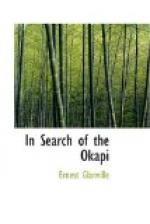THE HUNTER
“Dick, why do you study Arabic so closely?”
“To understand Arabic.”
“And further?”
Dick Compton closed his book and placed it carefully in a leather case.
“It is a pity you were born curious, Venning, otherwise you would have made an excellent companion for a studious man. ’Why do I wish to understand Arabic?’ Why do you stand on one leg watching a tadpole shed its tail.”
“Excuse me, I always sit down to watch a tadpole.”
“Yet I have seen you poised on one leg for an hour like a heron, afraid to put down the other foot lest you should scare some wretched pollywog. Why?”
“I do it for the love of the thing, Dick. What is a page of your crooked signs compared with a single green pond and all that it holds?”
“By Jove! Is that so—and would you find a volume in a caterpillar?”
“Why not? Listen to me, Dick. Take the silver-spiked caterpillar, with a skin of black satin and a length that runs to four inches. He lives his life in the topmost boughs of an African palm—a feathered dome amid the forest—and there beneath the blue sky he browses till he descends into the warm earth to sleep in chrysalis form before he emerges as a splendid moth, with glass windows in his wide wings to sail with the fire-flies through the dark vaults of the silent woods.”
“All that from a caterpillar?”
“That and much more, Dicky.”
“And where will this study of the caterpillar lead you, Godfrey? One can’t live on a caterpillar.”
“Yet there is one kind—fat and creamy—that makes good soup.”
“Ugh, you cormorant! But tell me seriously, what is the end of your studies—where will they lead you?”
“To Central Africa.”
“Do you mean that, Venning?”
“I do, Dick. There is one spot on the map of Africa that is marked black. That spot is covered over hundreds of square miles by the unexplored forest. Think what that means to me!”
“Fever most likely—or three inches of spear-head.”
“A forest big enough to cover England! Just think of the new forms of life—from a new ant to an elephant or hornless giraffe. The okapi was discovered near that great hunting-ground—and, who is to say there are not other animals as strange in its untrodden depths?”
“Is it a wild-fowl, the okapi?”
“A wild-fowl, you duffer!” exclaimed Venning, indignantly. “Haven’t you heard of the dwarfed giraffe, part zebra, discovered by Sir Harry Johnston? It lost the long neck of the original species which browses in the open veld by the necessity to adapt its habits to the changed conditions of life within the forest.”
“Your neck is rather long, my boy, from much stretching to watch things. Look out that you don’t have it shortened. And so you intend to visit Central Africa? That is very curious!”




